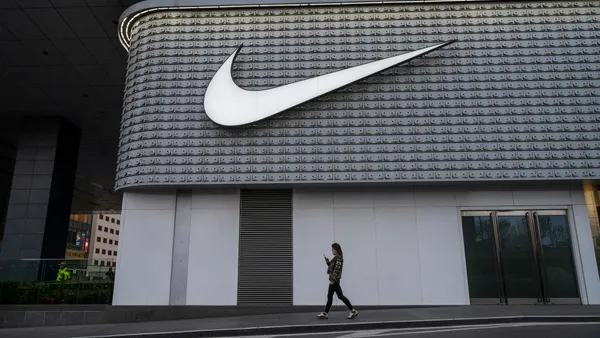Dive Brief:
- Moody's on Thursday downgraded J.C. Penney's corporate family credit rating, to B1 from B2. Some of the retailer's specific debt instruments were rated lower, including a senior unsecured note that Moody's dropped from a B3 rating to Caa1, indicating a very high credit risk.
- In a Thursday note to investors, Moody's Vice President Christina Boni cited as reasons for the downgrade, "continued weakness in operating performance coupled with the uncertainty in its strategic plan given the recent departure of its CEO." She added, "Although the company has opportunities for further improvements in merchandising, sourcing and operations as well as very good liquidity, significant headwinds remain."
- Moody's joins S&P Global, which lowered its ratings on some of Penney's bonds deeper into junk territory in May, following news of then-CEO Marvin Ellison's departure to Lowe's and a disappointing first quarter.
Dive Insight:
J.C. Penney in 2018 has plenty of things going for it: The company has a strong beauty game with its Sephora shops, it has been increasing its home and appliance sales — in no small part thanks to the relentless wave of Sears closures — and the company's comparable sales are still (barely) positive.
But Penney has struggled to show a consistent improvement in its top and bottom lines. Its turnaround efforts have produced spotty results of late, with Penney struggling to find its footing in a fundamental area: apparel.
"J.C. Penney must close the operating performance gap with its department store peers, as well as manage weak mall traffic and continued market share gains by off-price and online retailers," Boni said.
Now, with a leadership vacuum at the top, there are even more questions as to Penney's health in the space. Under Ellison, who joined in 2014, Penney has been largely successful at stemming the heavy flow of sales and money out of the company that began in 2012. It even made a profit in 2016 — which it followed up with a $116 million loss in 2017.
Ronald Tysoe, the company's chairman since Ellison stepped down as board chair in May, has created in Ellison's place an "Office of the CEO," comprised of current high-level execs to run the retailer while it searches for a new chief. Cowen analyst Oliver Chen said in a May note that he expected the search for a CEO to take around six months or more.
Chen described Ellison's departure as "difficult news," as many of the CEO's initiatives are still ongoing and his "strengths in appliance execution and leadership skills will be difficult to replicate." He added that Penney, in searching for a replacement, should target someone with a "robust understanding/appreciation" of digital retail, a record of apparel execution, and pricing and marketing skills.
Hanging over Penney — as the mall-bound retailer tries to find its way in what Ellison described earlier this year as "the most challenging and competitive retail market we've seen in 50 years" — is a massive debt load. For 2017, the company's total debt stood at $4.2 billion and its net interest expense paid in the year was $325 million. That is nearly double Penney's operating income. Its cash-to-debt ratio was just under 11%, down about 7% from the previous year.
Data from CreditRiskMonitor, a service that tracks bankruptcy risk based on several metrics and data streams, currently indicates that Penney has between a 4% and 9.99% chance of filing for bankruptcy within the next 12 months. Moody's, however, pointed to the retailer's total liquidity of $2 billion as a major operating strength.
"They have a huge amount of debt, which they've refinanced. That pushed doomsday out for them," Paul Vogel, a real estate consultant who helped oversee J.C. Penney's expansion in the 1960s, told Retail Dive this spring. "They're in a very difficult operating position. The competition is moving very fast. The good players out there are getting very sophisticated."














